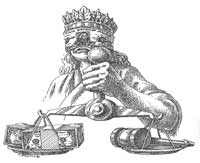
|


|

|
| This page is Bobby
Worldwide Approved for Section 508. |
|
 |
 |
 |

For a PDF version of this article, click
here.
Courtroom Cover-Ups
EDITORIAL
The Courier-Journal (Louisville, KY)
Sunday, September 8, 2002
|
 Image of "Blind Justice" by T. Brinton.
Image of "Blind Justice" by T. Brinton.
|
THE battle over sealed records, in
cases of alleged sexual abuse by priests, is just the latest round
in a long fight to protect the credibility of our judicial system.
That's what's at stake: nothing less than public confidence in the
mechanics of American justice.
Secret justice is a contradiction in terms. The federal judges in
South Carolina know that, so they've decided, unanimously, to ban
secret legal settlements, believing that closed case files make the
courts complicit in covering up information the public needs and
deserves - for example, about dangerous products, bad doctors and
predatory clergy.
Secrecy in product liability, personal injury and sexual abuse suits
comes up most often in state courts, where, at least in Kentucky,
the usual practice is to file only a paper saying a settlement has
been reached in a civil suit. Thus the details are never made part
of the court record. This means that in many cases, the public is
denied information it deserves.
Locally, we have seen the consequences of shrouding the work of the
courts. Then-Circuit Judge John Potter tried, without success, to
make public the details of an agreement between Eli Lilly & Co.,
the maker of the drug Prozac, and the victims of the Standard
Gravure shooting, which excluded some evidence from trial in return
for payments to victims and families.
There are innumerable examples of attempted secrecy - from the Mike
Troop sexual harassment settlement here to the Wen Ho Lee plea
agreement in New Mexico, from cases involving the painkiller Zomax
and side-mounted GM gas tanks to injury suits involving retailers
like Home Depot and Wal-Mart.
It wasn't always so. Arthur Bryant of Trial
Lawyers for Public Justice told the Los Angeles Times,
"This practice has exploded in the last 20 years . . . it's
cheaper to hide the truth from the public."
On the other side, Harvard law professor Arthur Miller, offering the
usual caveats, warns that a blanket prohibition against secret
settlements could discourage the filing and settling of suits and
could threaten trade secrets and personal privacy. His reasonable
sounding call for flexibility will serve as welcome shelter for
those who should
face a storm of criticism over promoting secrecy.
Calls for privacy sell well. They appeal to Americans' traditional
fear of intrusive power, especially government. But the claim of a
right to privacy, which is in no way applicable to a corporation,
shouldn't trump other, more important public goals, like an open
justice system.
As the 6th U. S. Circuit Court of Appeals declared recently in
rejecting the Bush Justice Department's attempt to close immigration
hearings, "A government operating in the shadow of secrecy
stands in complete opposition to the society envisioned by the
framers of our Constitution."
In that opinion, Judge Damon Keith wrote for a unanimous panel,
"Democracies die behind closed doors. . . . When the government
begins closing doors, it selectively controls information rightfully
belonging to the people. Selective information is
misinformation."
Again this year, the Freedom
Forum First Amendment Center sponsored a national
poll on attitudes toward the First Amendment. It found that 48
percent of Americans believe there's too little access to government
records, as opposed to 8 percent who think there's too much.
So this much is clear: Those who stand for openness are standing
with the people.
|
 |
 |

 Image of "Blind Justice" by T. Brinton.
Image of "Blind Justice" by T. Brinton. 